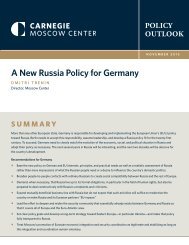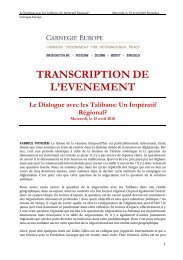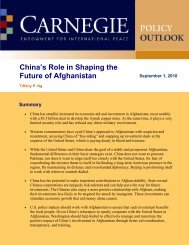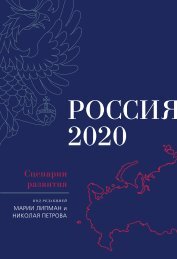Democracy Promotion Under Obama - Carnegie Endowment for ...
Democracy Promotion Under Obama - Carnegie Endowment for ...
Democracy Promotion Under Obama - Carnegie Endowment for ...
Create successful ePaper yourself
Turn your PDF publications into a flip-book with our unique Google optimized e-Paper software.
DEMOCRACY PROMOTION UNDER OBAMA: FINDINg A WAY FORWARD 7<br />
will also work well to open U.S. democracy<br />
policies and programs to greater cooperation<br />
with European and other international actors<br />
working on democracy’s behalf.<br />
Fourth, President <strong>Obama</strong>’s emphasis on the<br />
potentially positive role of government in solving<br />
social problems—his credo that what counts<br />
is not whether government is large or small but<br />
whether it works—fits well with a crucial rising<br />
imperative: dozens of new democracies<br />
are facing serious challenges in showing their<br />
citizens that democracy can effectively solve<br />
basic socioeconomic problems. The previous<br />
Washington philosophy that government is<br />
the problem rather than the solution hindered<br />
the ef<strong>for</strong>ts of U.S. providers of democracy<br />
aid to help countries move beyond establishing<br />
democratic institutions to helping those<br />
institutions actually deliver <strong>for</strong> their citizens.<br />
The new attitude from the top in Washington<br />
about government’s potentially positive role<br />
can thus be a boost <strong>for</strong> U.S. democracy promotion.<br />
In addition, a greater focus on making<br />
certain parts of the U.S. government work<br />
well—especially the United States Agency <strong>for</strong><br />
International Development, the largest source<br />
of U.S. democracy aid—would also be a valuable<br />
part of an <strong>Obama</strong> democracy policy.<br />
Fifth, <strong>Obama</strong>’s rhetorical style—his unusual<br />
ability to meld inspiration with restraint—<br />
is exactly the note to strike in crafting a new<br />
line about the role of democracy promotion<br />
in U.S. <strong>for</strong>eign policy. U.S. presidents almost<br />
always end up presenting U.S. democracy<br />
promotion in grander terms than actual<br />
policy reflects. Some amount of inspirational<br />
license is inevitable and can be worthwhile.<br />
However, given the lingering soreness of the<br />
subject <strong>for</strong> most <strong>for</strong>eign audiences, a considerable<br />
dose of sobriety is very much in order<br />
without giving up entirely on inspiration.<br />
President <strong>Obama</strong>’s core message, rein<strong>for</strong>ced<br />
by his disposition, his political philosophy,<br />
and his life experience, is that all people, no<br />
matter how disempowered, can gain greater<br />
control over their lives. It is a natural message<br />
of global democratic solidarity.<br />
Given the harsh legacy of Bush’s democracy<br />
promotion ef<strong>for</strong>ts and the choppy waters <strong>for</strong><br />
democracy in many regions, the search <strong>for</strong> a<br />
new framework <strong>for</strong> U.S. democracy promotion<br />
may appear daunting. Yet those engaged<br />
in the task need not look any further than<br />
to the new president’s cardinal values <strong>for</strong> the<br />
<strong>Obama</strong>’s rhetorical style—his unusual ability to meld<br />
inspiration with restraint—is exactly the note to<br />
strike in crafting a new rhetorical line about the role<br />
of democracy promotion in u.s. <strong>for</strong>eign policy.<br />
necessary key operational ideas: nonconfrontational,<br />
measured, persistent, bipartisan, cooperative,<br />
effective, and empowering. If the<br />
new administration can put those principles<br />
to work in the domain of democracy support,<br />
the United States will regain its place as a respected,<br />
trusted, and influential ally of democracy<br />
around the world. n<br />
The <strong>Carnegie</strong> <strong>Endowment</strong> normally does not<br />
take institutional positions on public policy<br />
issues; the views presented here do not<br />
necessarily reflect the views of the <strong>Endowment</strong>,<br />
its officers, staff, or trustees.<br />
© 2009 <strong>Carnegie</strong> <strong>Endowment</strong> <strong>for</strong> International<br />
Peace. All rights reserved.
















